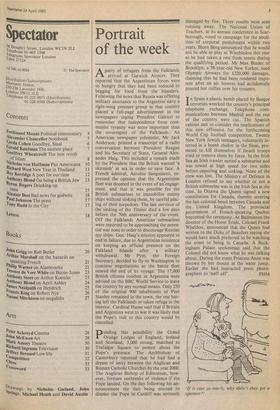Portrait of the week
Aparty of refugees from the Falklands arrived at Gatwick Airport. They reported that the Argentinian forces were so hungry that they had been reduced, to begging for food from the islanders. Following the news that Russia was offering military assistance to the Argentine navy a right-wing pressure group in that country placed a full-page advertisement in the newspapers urging President Galtieri to remember that independence from com- munist tyranny was more important than the sovereignty of the Falklands. An American newspaper columnist, Mr Jack Anderson, printed a transcript of a radio conversation between President Reagan and his Secretary of State, General Alex- ander Haig. This included a remark made by the President that the British wanted 'a skirmish' at sea in order to save face. A French admiral, Antoine Sanguinetti, ex- pressed the opinion that the Argentinian fleet was doomed in the event of an'engage- ment, and that it was possible for the British submarines to immobilise enemy ships without sinking them, by careful plac- ing of their torpedoes. The last survivor of the sinking of the Titanic died a few days before the 70th anniversary of the event. Off the Falklands American submarines were reported to be approaching the poten- tial war zone in order to discourage Russian spy ships. Gen. Haig's mission appeared to end in failure, due to Argentinian insistence on keeping an official presence on the Falkland Islands after a military withdrawal. Mr Pym, the Foreign Secretary, decided to fly to Washington to continue negotiations as the battle fleet neared the end of its voyage. The 17,000 British citizens resident in Argentina were advised on the BBC World Service to leave the country by any normal means. Only 250 of the original 900 inhabitants of Port Stanley remained in the town, the rest hav- ing left the Falklands or taken refuge in the interior. Cardinal Hume said that if Britain and Argentina went to war it was likely that the Pope's visit to this country would be cancelled.
Pending this possibility the Grand Orange Lodges of England, Ireland and Scotland, 3,000 strong, marched to Trafalgar Square to protest about the Pope's presence. The Archbishop of Canterbury reported that he had had a dream of unity between the Anglican and Roman Catholic Churches by the year 2000. The Anglican Bishop of Edmonton, how- ever, foresaw outbreaks of violence if the Pope landed. On the day following his an- nouncement the dais being erected to display the Pope in Cardiff was seriously
damaged by fire. Three youths were seen running away. The National Union of Teachers, at its annual conference in Scar- borough, voted to campaign for the aboli- tion of corporal punishment within two years. Bjorn Borg announced that he would not be able to play at Wimbledon this year as he had taken a rest from tennis during the qualifying period. Mr Max Binder of Brooklyn, a 58-year-old New Yorker, sued Olympic Airways for £320,000 damages, claiming that he had been rendered impo- tent after an air hostess had accidentally poured hot coffee over his trousers.
In Spain a plastic bomb placed by Basque terrorists wrecked the country's principal telephone exchange. Telephone com- munications between Madrid and the rest of the country were cut. The Spanish cabinet met to consider the implications of this new offensive for the forthcoming World Cup football competition. Twenty New York Jewish teenagers, voluntarily in- terred in a bomb shelter in the Sinai, pro- mised to kill themselves if Israeli troops tried to remove them by force. In the Irish Sea an Irish trawler netted a submarine and was towed at high speed for two miles before capsizing and sinking. None of the crew was lost. The Ministry of Defence in London refused to say whether or not a British submarine was in the Irish Sea at the time. In Ottawa the Queen signed a new constitution for Canada, thereby severing the last colonial bond between Canada and the United Kingdom. The provincial government of French-speaking Quebec boycotted the ceremony. At Badminton the director of the Horse Trials, Colonel Frank Wheldon, announced that the Queen had written to the Duke of Beaufort saying she would have much preferred to be watching the event to being in Canada. A Buck- ingham Palace spokesman said that the Colonel did not know what he was talking about. During the event Princess Anne was thrown by her mount at the water jump. Earlier she had instructed press photo-
graphers to `naff off. PHM
`If it cost so murk, why didn't they get a sponsor?'






































 Previous page
Previous page